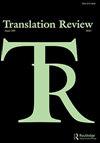The Limit of Political Possibilities in Corporeal Translations: Achy Obejas’s Translation of Rita Indiana’s La Mucama de Omicunlé
IF 0.3
3区 文学
0 LANGUAGE & LINGUISTICS
引用次数: 0
Abstract
In just under 200 pages, Rita Indiana masterfully interweaves dystopian, magical, and queer elements in her 2015 novel, La mucama de Omicunlé. Indiana offers a grim commentary on past, present, and future life in the Dominican Republic and on the political and environmental forces that threaten to destroy the archipelago. Given La mucama de Omicunlé’s complex form and content—revolving around a transgender character and former sex worker named Acilde—Achy Obejas faced a particularly challenging task as the Spanish-intoEnglish translator. Uncommon among other literary translators, Obejas translates literature both from Spanish into English and from English into Spanish and has therefore been described as a “bitextual translator.” In her most recent translation projects, Obejas aims to bring the timely works of Rita Indiana, a queer feminist Dominican writer and musician, to the Anglophone reader’s attention. Indiana and Obejas’s working relationship began in 2016 with the translation of Papi, Indiana’s third novel. Tentacle (2018, translation of La mucama de Omicunlé, 2015) marks Obejas’s second collaborative project with Indiana. When looking at the scope of Rita Indiana and Achy Obejas’s respective creative work, it is fitting that the pair would decide to collaborate as author and translator on two separate occasions. Indiana and Obejas’s relationship can be contextualized through Sonia Álvarez’s ideas on “translocas,” the cross-disciplinary and cross-border group of Latina and Latin American feminists who seek to disrupt heteronormative patriarchal racisms and sexisms across the Americas. Álvarez defines “translocas” as “women trans/dislocated in a physical sense and the (resulting) conceptual madness linked to attempts to understand unfamiliar scenarios with familiar categories: women and categories out of place.” As queer and diasporic Caribbean women, Indiana and Obejas work together, across the Caribbean Sea, to challenge the cisheteropatriarchy and its racist and sexist ideals, all while affirming their rightful place in the largely homogenized world literature canon. Indiana’s literary text has received significant critical attention, but translation scholars have yet to evaluate Obejas’s Tentacle, which was shortlisted for the 2020 Best Translated Book Award. Although Obejas’s translation hews closely to the original Spanish, there are some striking differences between the two texts, especially in relation to descriptions of the protagonist and his trans body. Specifically, although Acilde is misgendered in both versions, its effect is most apparent in Obejas’s translation because of her consistent use of gender pronouns. I argue, however, that Obejas’s translation exposes ideas of corporality and gender identity that are inherently more ambiguous in the original, primarily because of the nature of the Spanish language and its ability to omit gendered subject pronouns. Obejas’s decision recalls, then, Gayatri Chakravorty Spivak’s view of translation as an intimate act of reading, thus calling for the queer feminist translator to surrender themselves to the original text. As Spivak argues, “[The queer feminist translator] must be able to confront the idea that what seems resistant in the space of English may be reactionary in the space of the original language.” Indeed, Obejas respects Indiana’s creative discourse to adhere to the gender binary, even if that means that the protagonist will be misgendered. Furthermore, Obejas’s version sheds light on the painful and universal reality of misgendering. For this reason, I see the translator’s decision as a critical exposition of the transphobia and homophobia that both Hispanophone and Anglophone readerships encounter. Beyond Spivak’s queer feminist perspective, my reading of Tentacle enters into dialogue with intersectional critique within transgender studies. Over TRANSLATION REVIEW 2022, VOL. 113, NO. 1, 22–32 https://doi.org/10.1080/07374836.2022.2068712肉体翻译中政治可能性的极限——阿奇·奥贝哈斯译自丽塔·印第安娜的《人的生活》
在不到200页的篇幅里,丽塔·印第安纳在她2015年的小说《奥密库莱的女人》中巧妙地交织了反乌托邦、魔法和酷儿元素。印第安纳州对多米尼加共和国的过去、现在和未来生活,以及威胁摧毁该群岛的政治和环境力量进行了严峻的评论。考虑到《奥密库莱》复杂的形式和内容——围绕着一个名叫Acilde的跨性别角色和前性工作者——Achy Obejas作为西班牙语翻译面临着一项特别具有挑战性的任务。Obejas在其他文学翻译家中并不常见,她将文学从西班牙语翻译成英语,从英语翻译成西班牙语,因此被称为“双文本翻译家”。在她最近的翻译项目中,Obejas旨在将多明尼加酷儿女权主义作家和音乐家Rita Indiana的及时作品吸引英语读者的注意。Indiana和Obejas的工作关系始于2016年,翻译了Indiana的第三部小说《Papi》。Tentacle(2018,La mucama de Omicunlé的翻译,2015)标志着Obejas与印第安纳州的第二个合作项目。当审视Rita Indiana和Achy Obejas各自的创作范围时,两人决定在两个不同的场合作为作者和译者合作是很合适的。印第安纳州和奥贝哈斯的关系可以通过索尼娅·阿尔瓦雷斯关于“跨地域”的想法来理解,“跨地域者”是一个跨学科、跨国界的拉丁裔和拉丁美洲女权主义者群体,他们试图破坏美洲各地的异规范父权制种族主义和性别歧视。阿尔瓦雷斯将“跨性别者”定义为“在身体意义上跨性别/错位的女性,以及与试图理解陌生场景和熟悉类别相关的(由此产生的)概念上的疯狂:女性和类别错位。”由于酷儿和流散的加勒比女性,印第安纳州和奥贝哈斯在加勒比海对岸合作,挑战顺异父权制及其种族主义和性别歧视的理想,同时确认他们在基本同质化的世界文学经典中的合法地位。印第安纳州的文学文本受到了评论界的高度关注,但翻译学者尚未对入围2020年最佳翻译图书奖的奥贝哈斯的《触手》进行评价。尽管奥贝哈斯的翻译与西班牙语原文非常接近,但这两个文本之间存在一些显著的差异,尤其是在对主人公及其跨性别身体的描述方面。具体来说,尽管Acilde在两个版本中都被误解了,但由于她一贯使用性别代词,其效果在Obejas的翻译中最为明显。然而,我认为,Obejas的翻译暴露了语料库和性别认同的思想,这些思想在原文中本质上更加模糊,主要是因为西班牙语的性质及其省略性别主代词的能力。Obejas的决定让人想起了Gayatri Chakravorty Spivak将翻译视为一种亲密的阅读行为的观点,从而呼吁酷儿女权主义译者屈服于原文。正如斯皮瓦克所说,“(酷儿女权主义译者)必须能够面对这样一种观点,即在英语空间中看似具有抵抗力的东西,在原始语言空间中可能是反动的。”事实上,奥贝哈斯尊重印第安纳州坚持性别二元的创造性话语,即使这意味着主人公会被误导。此外,Obejas的版本揭示了误导的痛苦和普遍现实。出于这个原因,我认为译者的决定是对西班牙语和英语读者所遇到的跨性别恐惧症和恐同症的批判性阐述。除了斯皮瓦克的酷儿女权主义视角之外,我对《触手》的阅读与跨性别研究中的交叉批判展开了对话。2022年翻译综述,第113卷,第1期,22-32https://doi.org/10.1080/07374836.2022.2068712
本文章由计算机程序翻译,如有差异,请以英文原文为准。
求助全文
约1分钟内获得全文
求助全文

 求助内容:
求助内容: 应助结果提醒方式:
应助结果提醒方式:


